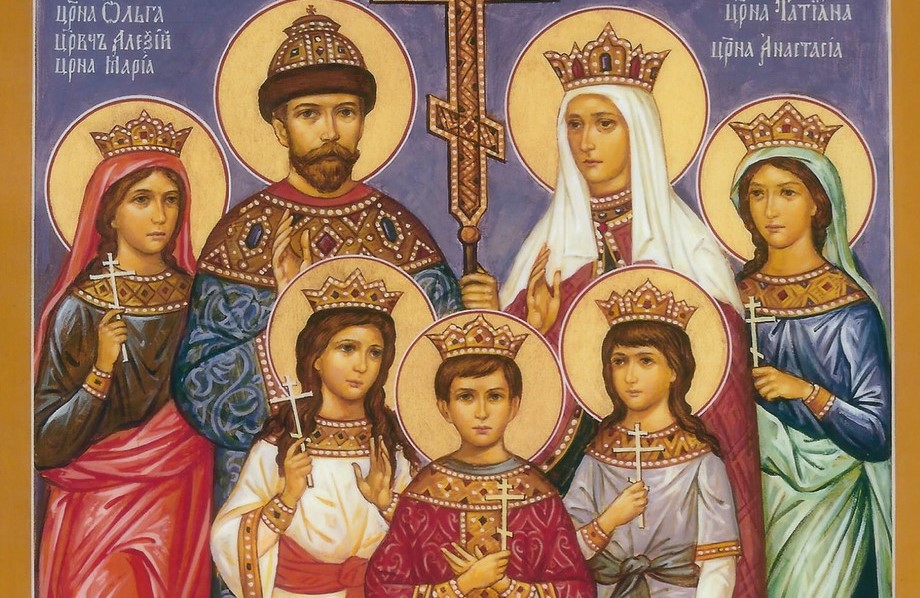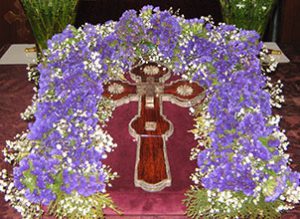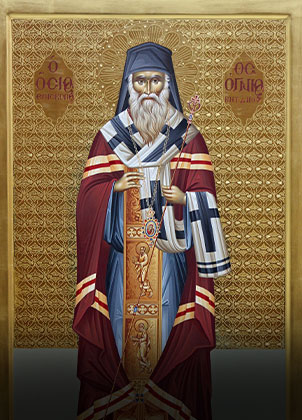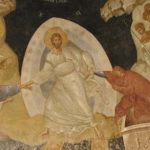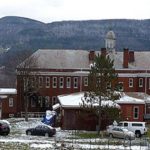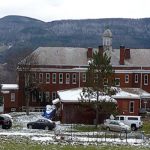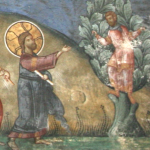Св. Новомученики и Исповедники Российские были прославлены Русской Зарубежной Церковью 1 ноября 1981 года. Тогда были составлены две службы Новомученикам: Архиеп. Антоний Сан-Францисский составил службу всем св. Новомученикам, которая служится в январе, а Архиеп. Антоний Лос-Анджелесский составил отдельную службу св. Царственным Мученикам, совершаемую в день их убиения 17 июля. 40 лет назад 17 июля 1982 г. впервые вместо обычной панихиды в храмах Зарубежной Церкви была совершена похвальная служба св. Царственным Мученикам. В память этого юбилея ниже помещается слово Святителя Иоанна (Максимовича), архиепископа Шанхайского и Сан-Францисского чудотворца, сказанное в 1934 г. перед панихидой в день убиения Царственных Мучеников.
Во имя Отца и Сына и Святого Духа.
Святая Церковь завтра прославляет св. Андрея епископа Критского, творца Великого покаянного канона, а мы собрались, чтобы молиться об упокоении души Царя-Мученика и иже с ним убиенных. В России также ежегодно собирались русские люди в храмы в день св. Андрея Критского, но не того, который прославляется завтра, а преподобномученика Андрея, замученного за исповедание Христа и правды Христовой. В этот день преподобномученика Андрея в России люди с радостным чувством собирались благодарить Господа за чудесное спасение Государя Александра III в Борках 17 октября 1888 года. Во время его путешествия произошло страшное крушение поезда, все вагоны были разбиты кроме одного, в котором находился Царь со своей Семьей.
Так в день преподобного Андрея Критского, замученного врагами Христа и Его Церкви, был спасен Наследник, а впоследствии Государь Николай Александрович, и также в день св. Андрея Критского, но мирно окончившего свои дни на земле, Государь был убит безбожниками и изменниками. В день Андрея мученика Россия прославляла и празднуемого в один день с ним пророка Осию, предсказавшего воскресение; в их честь строились храмы, где народ русский благодарил Бога за спасение Государя. А через 30 лет, в день св. Андрея, учившего о покаянии, Государь был умерщвлен на глазах всего народа, не сделавшего даже попытки его спасти. Это тем более страшно и непонятно, что Государь Николай Александрович воплотил в себе лучшие черты царей, которых знал, любил и почитал русский народ.
Царь-Мученик более всего походил на Царя Алексея Михайловича, Тишайшего, но превосходил его своей непоколебимой кротостью. Россия знала Александра II, Освободителя, но Царь Николай II освободил еще больше народа из братского славянского племени. Россия знала Александра III, Миротворца, а Государь Николай II не ограничивался только попечением о мире в свои дни, но сделал крупный шаг к тому, чтобы все народы Европы и всего мира жили миролюбиво и разрешали свои недоразумения мирным путем. С этой целью, по безкорыстному и благородному личному почину его, была созвана Гаагская конференция. Россия восхищалась Александром I-м и назвала его благословенным за то, что он освободил Европу от чуждой власти одного человека. Государь Николай II, в условиях во много раз более трудных, восстал против такой же попытки другого человека распространить свою власть на чуждый ему по крови и вере славянский народ и в защите его проявил стойкость, не знающую компромиссов. Россия знала великого преобразователя Петра I, но если припомнить все преобразования Николая II, то мы не знаем, кому отдать предпочтение, при чем последним преобразования были проведены более внимательно, обдуманно и без резкости. Иоанна III, Иоанна Калиту, Россия знала как собирателей России, но до конца довел их дело Государь Николай II, когда в 1915 году вернул России, хотя и на краткое время, всех ее сынов. Государь Всероссийский — он первый и единственный был Царем Всерусским.
Его внутренний, духовный нравственный облик был так прекрасен, что даже большевики, желая его опорочить, могут упрекнуть его только в одном — в набожности. Доподлинно известно, что он всегда начинал и заканчивал свой день молитвой. В великие церковные празднества он всегда приобщался, при чем смешивался с народом, приступавшим к Великому Таинству, как это было при открытии мощей преподобного Серафима. Он был образец целомудрия и глава образцовой православной семьи, воспитывал своих детей в готовности служить русскому народу и строго подготовлял их к предстоящему труду и подвигу. Он был глубоко внимателен к нуждам своих подданных и хотел ясно и близко себе представить их труд и служение. Всем известен случай, когда он прошел один несколько верст в полном солдатском снаряжении, чтобы ближе понять условия солдатской службы. Он ходил тогда совсем один и тем ясно опровергаются клеветники, говорящие, что он боялся за свою жизнь. Если Петр I сказал, «а о Петре ведайте, что жизнь ему не дорога, жила бы Россия», то Государь Николай Александрович поистине, можно сказать, исполнил это. Говорят, что он был доверчив. Но великий Отец Церкви св. Григорий Великий говорил, что чем чище сердце, тем оно доверчивее.
Что же воздала Россия своему чистому сердцем, любящему ее более своей жизни Государю?
Она отплатила ему клеветой. Он был высокой нравственности — стали говорить о его порочности. Он любил Россию — стали говорить об измене. Даже люди близкие Государю повторяли эту клевету, пересказывали друг другу слухи и разговоры. Под влиянием злого умысла одних, распущенности других, слухи ширились и начала охладевать любовь к Царю. Потом стали говорить об опасности для России и обсуждать способы освобождения от этой несуществующей опасности, и во имя якобы спасения России, стали говорить, что надо отстранить Государя. Расчетливая злоба сделала свое дело: она отделила Россию от своего Царя и в страшную минуту во Пскове он остался один. Близких нет. Были преданные, но и их не допустили. Страшная оставленность Царя… Но не он оставляет Россию, Россия оставляет его, любящего Россию больше своей жизни. Видя это, и в надежде, что его самоумаление успокоит и смирит разбушевавшиеся страсти народные, Государь отрекается от Престола. Но страсть иногда не успокаивается, достигнув желанного, — она разгорается еще больше. Наступило ликование тех, кто хотел низвержения Государя. Остальные молчали. Последовал арест Государя и дальнейшие события были неизбежны. Если оставить человека в клетке со зверьми, то рано или поздно они его растерзают. Государь был убит, и Россия молчала. Не раздалось ни возмущения, ни протеста, когда совершалось это страшное злодеяние, и это молчание есть великий грех русского народа, совершенный в день Св. Андрея Критского, творца Великого покаянного канона, читаного Великим постом…
Под сводом Екатеринбургского подвала был убит Повелитель Руси, лишенный людским коварством царского венца, но не лишенный Божией правдой священного миропомазания. Все цареубийства в истории России были произведены кучкой людей, но не народом. Когда был убит Павел I, народ и не знал об этом, а узнав, долгие годы приносил к его гробу сочувствие и молитвы. Убийство Александра II вызвало в России бурю возмущения, которая оздоровила нравственное состояние народа, и это сказалось в царствование Александра III. Народ остался чист от крови Царя Освободителя. Здесь же народ, весь народ виновен в пролитии крови своего Царя. Одни убили, другие одобряли убийство и тем совершили не меньший грех, третьи не помешали. Все виновны и поистине мы должны сказать: «Кровь его на нас и на детях наших». Измена, предательство, нарушение присяги на верность Царю Михаилу Феодоровичу и его наследникам без обозначения их имен, пассивность и окаменение, нечувствие — вот из чего русский народ сплел венок, которым увенчал своего Царя.
Сегодня день скорби и покаяния. Почему, спросим мы, Господь, спасши того же Царя в день Андрея Мученика, не спас его в день другого Андрея — учителя покаяния? С глубокой грустью отвечаем: да, Господь мог также чудесно его спасти и в этот день, но русский народ этого не был достоин.
Государь теперь принял мученический венец, но это не оправдание нам, не уменьшение нашей вины, как не оправданы, а еще сильнее обвинены Воскресением Христовым Иуда, Пилат и Каиафа и те, которые требовали от Пилата убийства Христа.
Великий грех поднять руку на Помазанника Божия. Когда Царю Давиду принесли известие об убийстве Саула, то он велел казнить вестника, хотя он не принимал участия в убийстве, но только поспешил принести эту весть и приписал себе убийство Царя. Не остается и малейшая причастность к такому греху неотмщенной.
В скорби мы говорим «кровь его на нас и на детях наших». Но будем помнить, что это злодеяние всего народа совершено в день св. Андрея Критского, зовущего нас к глубокому покаянию. Будем помнить, что нет предела милости Божией и нет такого греха, которого нельзя смыть покаянием. Но покаяние наше должно быть полное, без всякого самооправдания, без оговорок, с осуждением себя и всего злого дела от самого его начала.
После спасения Царской Семьи в Борках была начертана икона с изображением святых, имена коих носили Члены Царской Семьи. Быть может придет время, когда не небесные покровители их, а сами Царственные Мученики будут изображаться на иконах, в память вспоминаемого события. — Но теперь мы будем молиться об упокоении их душ и будем просить у Господа глубокого слезного покаяния и прощения для себя и для всего русского народа.
Аминь.
The New Martyrs and Confessors of Russia were canonised by the Russian Church Abroad on November 1, 1981. At that time two services were composed in their honour: Archbishop Anthony of San Francisco wrote a service for all New Martyrs, which is served in January, and Archbishop Anthony of Los Angeles composed a separate service to the Royal Martyrs celebrated on July 17, the day of their murder. Forty years ago, on July 17, 1982, in the Church Abroad for the first time the service of the Royal Martyrs was sung instead of the usual pannichida. In memory of this anniversary we have posted the sermon by St. John of Shanghai delivered in 1934 at pannichida for Tsar Nicholas II and those slain with him.
In the name of the Father and of the Son and of the Holy Spirit.
Tomorrow (July 4/17) the Holy Church praises Saint Andrew, the Bishop of Crete, the author of the Great Canon of Repentance, and at the same time we gather here to pray for the souls of the Tsar-Martyr and those assassinated with him. Likewise, people in Russia used to gather in churches on the day of the other Saint Andrew of Crete (Oct. 17), not the writer of the Great Canon whose day is celebrated tomorrow, but the Martyr Andrew, martyred for confession of Christ and His Truth. On the day of Martyr Andrew, people in Russia thanked God for the miraculous delivery of Emperor Alexander III from the train wreck at Borki on October 17,1888. In the terrible derailment which occurred during his journey, all the carriages of the train were wrecked, except the one carrying the Tsar and his Family.
On the day of the Martyr Andrew of Crete, martyred by enemies of Christ and His Church, the Heir to the throne and subsequent tsar, Nicholas Alexandrovich, was saved, and on the day of Saint Andrew of Crete the Canonist, who reposed in peace, the Tsar was assassinated by atheists and traitors. On the day of Martyr Andrew, Russia also celebrated the day of the Prophet Hosea, who foretold Christ’s Resurrection. Churches were built in honor of these saints wherever Russian people thanked God for the delivery of their Sovereign. Thirty years later, on the day of Saint Andrew the Canonist, who taught repentance, the Sovereign was assassinated before the eyes of the whole nation, that did nothing to save him. It is especially dreadful and incomprehensible since the Sovereign, Nicholas Alexandrovich, incarnated the best virtues of those Tsars whom the Russian people knew, loved, and esteemed.
Most of all the Tsar-Martyr resembled Tsar Alexis Michailovich Tishayshiy (the Most Meek, 1645-76) excelling in unshakable meekness. Russia knew Alexander II (1855-81) as Liberator, but Tsar Nicholas II liberated even more nations of the fraternal Slavic tribe. Russia knew Alexander III (1881-94) as Peacemaker but Sovereign Nicholas II did not limit himself to care for peace in his own days but made a significant step towards establishing peace in Europe and in all the world so that all nations should solve their controversies peacefully. To that purpose, by his dispassionate and noble initiative, the Hague Conferences (1) were called. Russia admired Alexander 1 (1801-25) and called him the Blessed One because he liberated Europe from the alien rule of a tyrant, Napoleon. Sovereign Nicholas II under much more difficult circumstances rose against another ruler’s attempt, Kaiser Wilhelm II, to enslave Slavic nations, and in the defence of that nation showed a determination that was devoid of compromises. Russia knew the Great Reformer Peter I but if we recall all the reforms of Nicholas II, we would be uncertain whom to give preference and the latter’s reforms were conducted more carefully, more thoughtfully, and without abruptness. John Kalita (1328-40) and John III (1449-1505), Grand Princes of Moscow, were known for uniting the Russian people, but their cause was finally accomplished only by Sovereign Nicholas when in 1915 he returned to Russia all her sons, though only for a short time. (2) Sovereign of All Russia, Nicholas 11 was the first Pan-Russian Tsar. His inner, spiritual, moral image was so beautiful that even the Bolsheviks in their desire to blacken him could blame him only for his piety.
It is known for certain that he always began and ended the day with prayer. He always received Communion on the days of the Church’s great holidays and often went to receive the Great Sacrament in a crowd of commoners, as for instance during the opening of the relics of Saint Seraphim of Sarov. He was an example of marital fidelity and the head of an exemplary Orthodox family, bringing up his children to be ready to serve the Russian people and strictly preparing them for the future labors and feats of that calling. He was deeply considerate towards his subjects’ needs and always wanted to ascertain clearly and acutely their labor and service. Everyone knows that he once marched alone many miles in soldier’s full equipment in order to better understand the conditions of a soldier’s service. He walked alone, which refutes the slanderers who say that he was afraid for his life. Peter I said: “know about Peter, that life is not precious for him, but may Russia live” and Sovereign Nicholas II indeed fulfilled his words. Some people say that he was credulous. But the great father of the Church, Saint Gregory the Great, says that the more pure the heart, the more credulous it is.
What did Russia render to her pure-hearted Sovereign, who loved her more than life?
She returned love with slander. He was of great morality, but people began to talk about his viciousness. He loved Russia, but people began to talk about his treason. Even the people close to the Sovereign repeated the slander, passing on to each other rumours and gossip. Because of the ill intention of some and the lack of discipline of others, rumours spread and love for the Tsar began to grow cool. They started to talk of the danger to Russia and discuss means of avoiding that non-existent danger, they started to say that to save Russia it would be necessary to dismiss the Sovereign. Calculated evil did its work: it separated Russia from her Tsar and in the dread moment at Pskov (3) he was alone; no one near to him. Those faithful to him were not admitted to his presence. The dreadful loneliness of the Tsar… But he did not abandon Russia, Russia abandoned him, the one who loved Russia more than life. Thus, in the hope that his self-belittling would still the raging passions of the people, the Sovereign abdicated. But passion never stills. Having achieved what it desires it only inflames more. There was an exultation among those who desired the fall of the Sovereign. The others were silent. They succeeded in arresting the Sovereign; succeeded, and further events were almost inevitable. If someone is left in a beast’s cage he will be torn to pieces sooner or later. The Sovereign was killed, and Russia remained silent. There was no indignation, no protest when that dread, evil deed happened, and this silence is the great sin of the Russian people, and it happened on the day of Saint Andrew, the writer of the Great Canon of Repentance, which is read in churches during Great Lent.
In the vaults of a basement in Ekaterinburg the Ruler of Russia was killed, deprived by the peoples’ insidiousness of the tsar’s crown, but not deprived of God’s Sacred Anointment. Hitherto, all the cases of regicide in the history of Russia were committed by cliques, not by the people. When Paul I was killed, people knew nothing about it and when it became known, for many years they brought to his grave compassion and prayers. The assassination of Alexander II produced in Russia a storm of indignation that healed the people’s morality and assisted the reign of Alexander III. The people remained innocent of the blood of the Tsar-Liberator Alexander II. But in the case of Nicholas II the entire nation is guilty of shedding the blood of its tsar. The assassins did the terrible deed, their masters approved the murder, sharing the same sin, the people did not prevent it. All are guilty and indeed we must say: “His blood is on us and on our children.” The garland with which the Russian people crowned their Tsar was made of treason, treachery, the breaking of the oath of allegiance to Tsar Michael Theodorovich, the first Tsar of the Romanov dynasty and his heirs, passivity, hardness of heart, and in sensitivity. Today is a day of sorrow and repentance. Why – we could ask – did the Lord save the Tsar [previously] on the day of Martyr Andrew and not save him on the day of the other Saint Andrew, the teacher of repentance? With deep grief we answer: the Lord could have saved him, but the Russian people did not deserve it.
The Sovereign received a martyr’s crown, but this neither justifies us, nor reduces our guilt, as the Resurrection of Christ does not justify, but condemns Judas, Pilate, and Caiphas and those who demanded from Pilate the murder of Christ.
It is a great sin to lift up a hand against the God-Anointed Sovereign. When the news of the murder of Saul was brought to King David, he ordered the execution of the messenger, although he knew that the messenger did not participate in the murder but only hurried to bring that news, and he ascribed the murder to him. Even the slightest participation in such a sin is not without retribution.
In sorrow we say, “his blood is on us and our children.” But let us remember that this evil deed of the whole nation was committed on the day of Saint Andrew of Crete, who calls us to deep repentance. Let us remember also, that there is no sin which cannot be washed away by repentance. But our repentance has to be full, without self-justification, without reserve, condemning ourselves and the evil deed from the very beginning.
After the deliverance of the Royal Family at Borki the icon depicting the patron saints of the family was painted. Perhaps the day will come when not just the patrons but also the Royal Martyrs themselves will be depicted on icons’ in remembrance of the event we recollect today.
But now let us pray for their souls and ask God for deep humble repentance and forgiveness for us and for all Russian people.
End notes:
1) Hague Peace Conference 1899 and 1907. Convened on the initiative of Emperor Nicholas II with the primary objective of limiting armaments on land and sea and furthermore prohibiting the use of asphyxiating gases, expanding (dumdum) bullets and the dropping of explosives from the air.
2) The offensive against the Austro-Hungarian Empire in 1915 once again incorporated all the lands of Ancient Kiev into the Russian Empire that had for almost 1000 years been under Hungarian rule.
3) The abdication of Tsar Nicholas 11 took place at Pskov on March 2, 1917.

